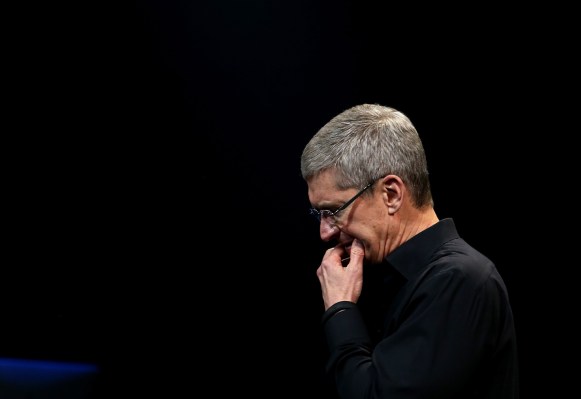Update: Apple has reached out to clarify that the Notice of proposed production activity at the Mesa, Arizona site relates to an application to renew the Foreign Trade-Zone status that the location already had at the time Apple acquired the site from its former supplier, GT Advanced Technologies.
And while it confirms it applied for a renewal of the FTZ status, triggering the Notice of proposed manufacturing activity, it emphasizes it does not intend to manufacture products at the site. Rather its intention is for Mesa to become a global command hub for its data center operations — meaning the site will be used as the central location where it receives and configures servers, assembling them into racks, before distributing the units for use in its various data centers.
Its application to renew Mesa’s FTZ status appears to be aimed at retaining certain distribution and logistical benefits that stem from having a site with the designation, rather than as a route to enabling it to expand manufacturing capabilities in the US.
At this stage the Mesa global data command hub is not yet operational. Once it is up and running, Apple says production at the site will be limited to assembling servers into racks.
Apple also noted it does use a range of US-based suppliers as part of its global manufacturing supply chain. Its annual supplier report lists 69 manufacturing facilities in the US, with US-based companies supplying components such as the glass in all iOS devices; iOS and Mac chips and processors; RF components for iPhone; and various display materials for iPhone, iPad and MacBook.
It adds that 33 different US states contribute to making its products, and has also previously shared that it works with 8,000 domestic suppliers — claiming its supply chain generates more than 360,000 US jobs.
Original story follows below.
Apple has submitted a proposal to expand its manufacturing capabilities at a site in Mesa, Arizona. The notification of proposed production activity was submitted by Apple on December 27, and published in the Federal Register yesterday.
The notice shows Apple seeking to expand its production capabilities at the site in Mesa to be able to produce finished products and utilize foreign status materials/components — including a laundry list of core electronics components, such as printed circuit board assemblies, lithium polymer batteries and monitors.
“The current request would add finished products and foreign status materials/components to the scope of authority,” the notice states.
The first product Apple is intending to manufacture at the Mesa site appears to be data server cabinets — which are listed in the title of the notice. This is not a consumer product Apple sells, so would presumably be used for building out its own data centers.
At the time of writing Apple could not be reached for comment but we’ve reached out with questions and will update this story with any response.
Cupertino does already assemble the Mac Pro in the US but this election cycle the company has come under high-profile political pressure from (the now) President-Elect Donald Trump to expand its on-shore manufacturing capabilities, with Trump calling for iPhones to be made in the US.
As well as pushing this suggestion on the campaign stump, Trump reportedly put it to Apple CEO Tim Cook during a phone call between the pair after he won the election — with Trump suggesting tax incentives could be used to persuade large corporations to set up manufacturing facilities in the US.
Apple’s current supply chain for devices such as the iPhone, iPad and Mac involves a web of assembly spread across multiple countries, mostly in Asia. So any moves to repatriate manufacturing, even greased by tax incentives, would undoubtedly take a long time to unpick and re-form such a complex supply chain system.
Not to mention requiring an army of cheap labour on tap at home to do the assembling, without which the cost of manufacturing the products would rise — likely pushing up their retail price-tag.
(Or, if enough humans couldn’t be found in the US labour force, a massive investment in assembly robots could be an alternative — such as we’re starting to see Apple outsourcer Foxconn make — which would presumably not be the kind of long term (human) jobs Trump was hoping to create…)
The Mesa Notice invites public comments from interested parties — with a closing date for receipt of February 21.
If Apple is granted production under the Foreign Trade-Zone procedure it could be exempt from customs duty payments on the listed foreign-status materials/components used in export production. While, for domestic sales, the notice states Apple would be able to choose the duty rate during customs entry procedures for the listed foreign-status materials/components.
“Customs duties also could possibly be deferred or reduced on foreign-status production equipment,” it adds.
According to Business Insider, which spoke to a source with knowledge of Apple’s data center plans, the servers Apple uses in facilities such as its data centers in Oregon and North Carolina are currently built and tested on-site, and Cupertino is intending to consolidate server manufacturing at the 1.2 million square foot Mesa site.
BI notes another report, by The Information last March, that said Apple has been working on projects to design its own data center operations for security reasons.
